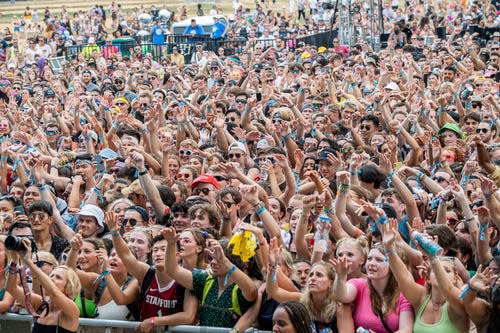'Not a disaster': Chicago officials tout Lollapalooza as success with 'no evidence' of being COVID-19 superspreader

CHICAGO — Hundreds of thousands of unmasked people crowded into Chicago’s downtown earlier this month for the outdoor music festival Lollapalooza, prompting a chorus of concerns from public health experts who worried the event would become a superspreader and fuel the spread of the delta variant.
More than two weeks later, Chicago officials are touting the event as a success with just over 200 resulting infections. But public health experts warn cases may be undercounted and say it's hard to identify a potential outbreak during the current virus surge.
While an estimated 385,000 people attended Lollapalooza, 203 people tested positive for COVID-19 in the two weeks after the event began, said Allison Arwady, commissioner of the Chicago Department of Public Health, at a news conference last week.
Arwady conceded more positive tests may still come in from other cities, but said, “there’s no evidence” that Lollapalooza was a superspreader event.
“We would have seen a surge if we were going to see a surge, at this point,” she said.
We are now 14 days past the first day of Lolla and we are continuing to investigate cases of COVID. There have been no unexpected findings at this point and NO evidence at this point of “super-spreader” event or substantial impact to Chicago’s COVID-19 epidemiology.
— Dr. Allison Arwady (@DrArwady) August 12, 2021
An estimated 88% of attendees were fully vaccinated, Arwady said. Of those who tested positive for COVID-19, 127 were vaccinated and 76 were unvaccinated. That means 0.04% of vaccinated Lollapalooza attendees tested positive while 0.16% of unvaccinated attendees did, she said.
No hospitalizations or deaths were reported, she added.
Related video: Live entertainment venues consider vaccine requirements
Robert Murphy, executive director of the Institute for Global Health at Northwestern University, called the results "amazing," and “caught many people by surprise.” He pointed to Lollapalooza as a potential model for future events.
“This could be a game changer,” said Murphy. “It opens the door for us to see what could be possible if we achieve herd immunity and shows that at almost a 90% vaccination rate, life can go on pretty normally.”
He said the apparently low number of positive cases could be the result of many factors, including it being outdoors and pandemic precautions that required concertgoers to show proof of vaccination or a negative coronavirus test and to wear a mask.
The demographics of the crowd also helped, as the immunocompromised or those with underlying high-risk conditions likely chose not to go, Murphy said. Most attendees were young and more likely to be asymptomatic.
Arwady said last week the 203 cases number was calculated from surveys, contact tracing and consulting other health departments.
Mercedes Carnethon, vice-chair of preventive medicine at Northwestern University Feinberg School of Medicine, raised concerns about “imprecise” contact tracing. She said contact tracers are often unable to reach a person, and many people are reluctant to be honest with them.
She added that many people may have been infected but not gotten tested because they were asymptomatic.
"This work is not always completely accurate and often gives us undercounts,” she said.
Carnethon said it may also be difficult to accurately track cases amid already existing surges in cases largely driven by the delta variant.
The average number of new daily COVID-19 cases in Chicago topped 400 on Monday for the first time since May, and the county’s transmission rate is considered "substantial" by the Centers for Disease Control and Prevention.
Tracking down out-of-town attendees who may have brought the virus home is also a challenge, Carnethon said.
Of the positive cases identified after Lollapalooza, 58 were Chicago residents and 138 were Illinois residents from outside of Chicago and seven were from out of state, Arwady said.
Carnethon said numbers of out-of-state cases are especially likely to be undercounts.
She said event organizers should rethink large events altogether as cases surge.
“Yeah it was not a disaster,” she said of Lollapalooza. “But I would fall short of using it as a model and strategy to hold these large events.”
Murphy acknowledged the positive cases likely were undercounted as asymptomatic people may never have been tested.
While he hopes people look at Lollapalooza as an example of herd immunity and further proof of the effectiveness of vaccines, he said more research into the fallout of the festival is needed.
“At first look, this is very encouraging,” he said. “But we need a little more time and analysis. Let's finish the story. Let's finish the analysis and see what happens over the next couple weeks.”
Contact News Now Reporter Christine Fernando at cfernando@usatoday.com or follow her on Twitter at @christinetfern.
This article originally appeared on USA TODAY: Lollapalooza not a COVID-19 'superspreader,' Chicago officials say
